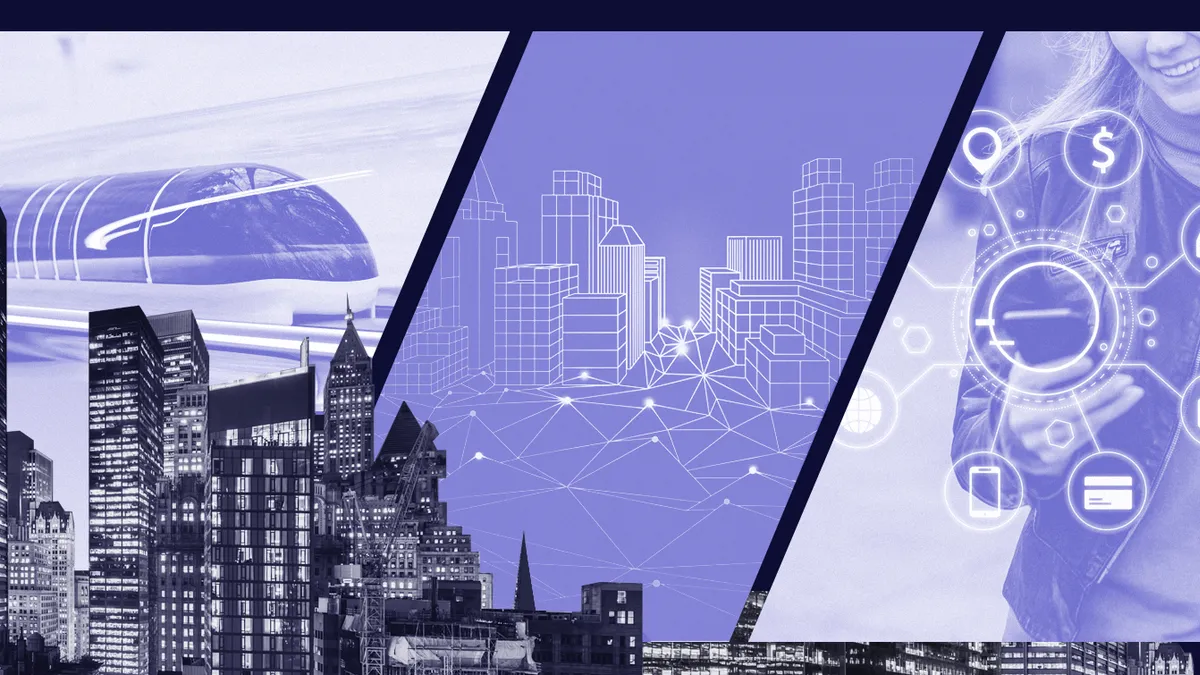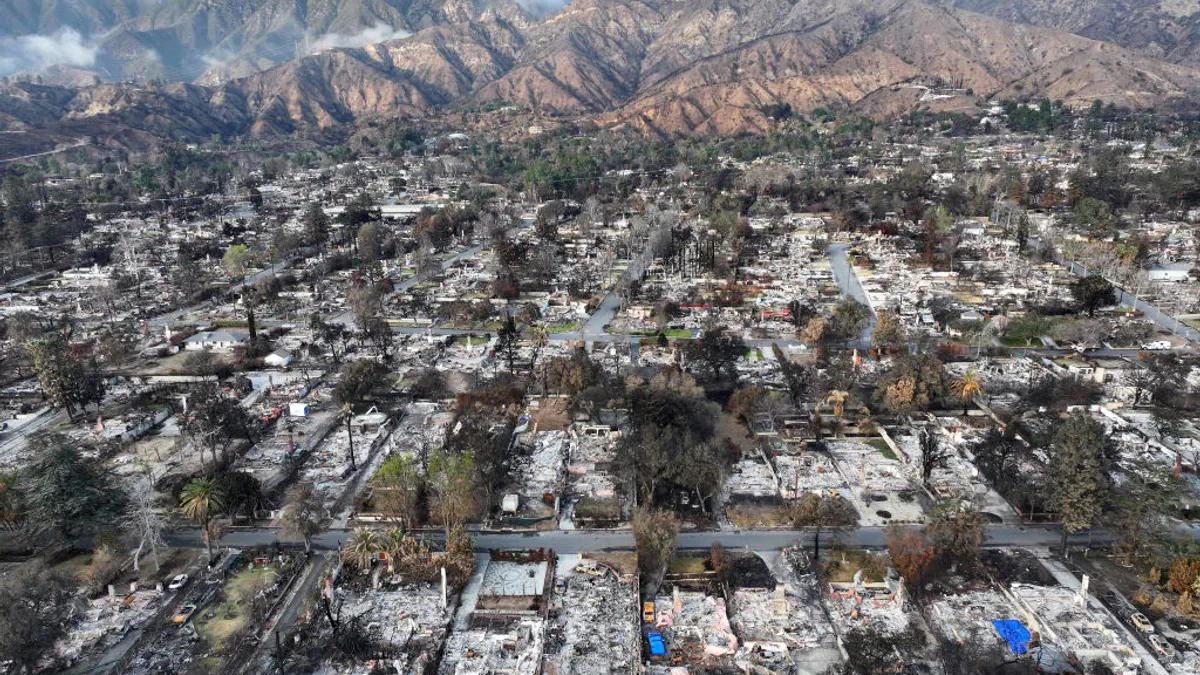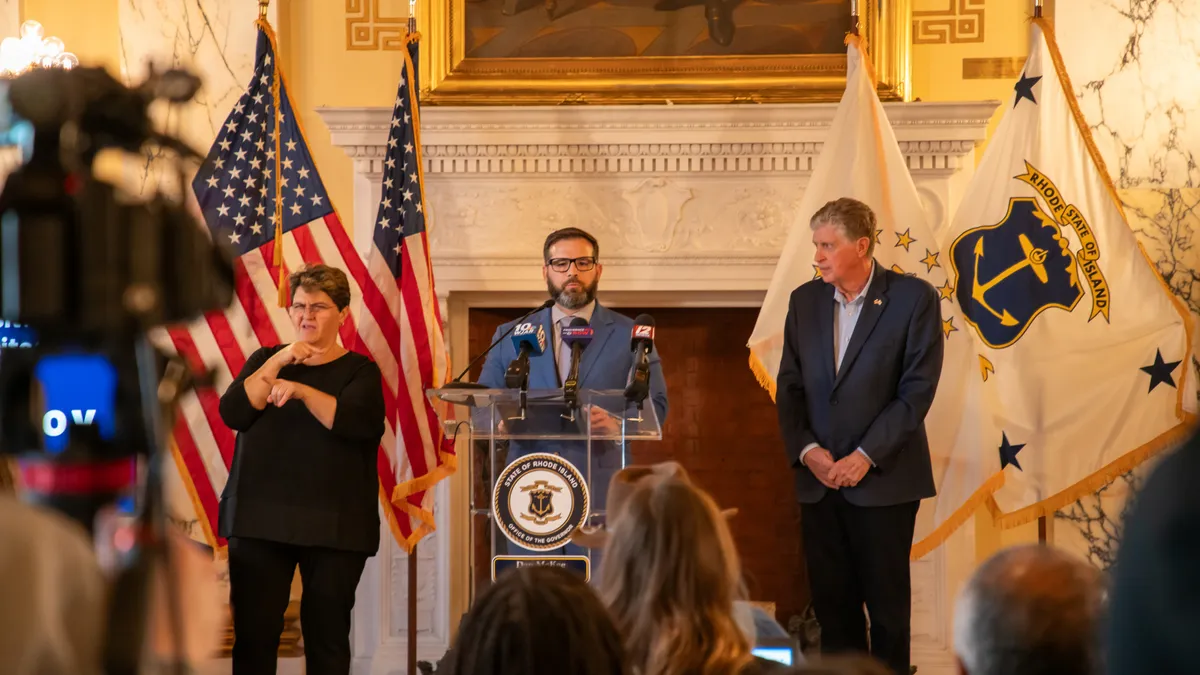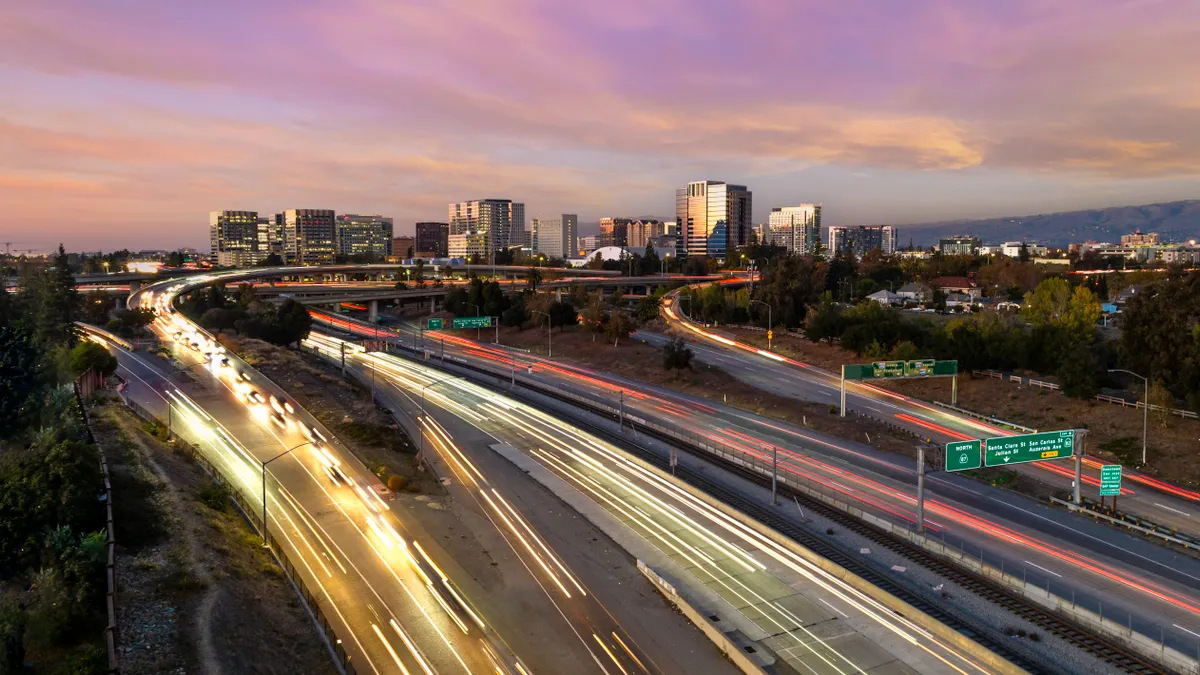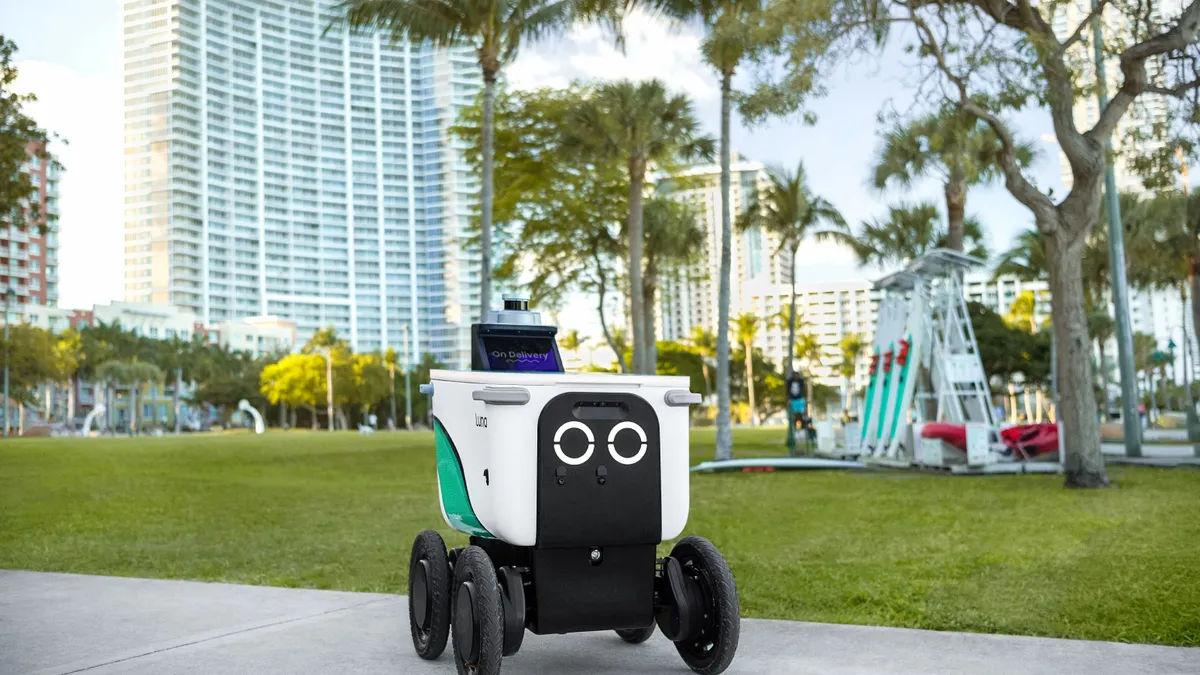Editor's note: This story is part of Smart Cities Dive's "Reassessing the smart cities movement" multipart series, which provides a look into the past, present and future of the space.
Smart streetlights have become almost ubiquitous within smart cities.
The technology is an example of a quintessential smart city project that can potentially address community challenges, Philadelphia Smart City Director Emily Yates said in response to a Smart Cities Dive survey conducted this fall about the smart cities movement.
In Cleveland, officials are working to convert 61,000 streetlights into a smart network. Chicago’s Department of Transportation has plans to use its streetlights to retrieve data on light outages and circuit failures. And Philadelphia is exploring streetlights as a means to expand access to public WiFi and monitor air quality.
Poor air quality is a major issue that disproportionately affects communities of color. Black residents are 75% more likely than white residents to live near traffic and pollution. Such data would help Philadelphia make more informed decisions on projects and investments that may impact air quality, Yates said.
"Philadelphia saw urban challenges amplified by COVID-19 and the Black Lives Matter movement — and this all happened while municipal budgets were being cut," said Yates. "With all of this in mind, 'smart cities' now have a big opportunity to move beyond just a focus on tech and data to doing projects for the sake of citizens."
To gauge where local leaders think the future of smart city tech like streetlights — and the movement at large — are headed, along with the potential limitations to getting there, Smart Cities Dive surveyed city leaders from 15 major U.S. cities. Leaders forecasted smart cities plans that include an emphasis on digital equity, data-driven decisions and community engagement, while anticipating potential obstacles like funding, tech security and resident trust.
Doubling down on digital justice, anti-racism and equity
Over the past five years, the smart cities movement has evolved from a tech-centered approach to one that focuses on addressing the needs of cities and their residents, these leaders said. That evolution includes protecting residents' digital rights and breaking down racial and digital inequities, efforts that cities say they will continue to address in the near future.
Portland, Oregon, Smart City PDX Manager Kevin Martin said in his survey response that the city plans to "continue to define and implement digital justice principles" over the next five years. He also said it aims to disrupt "historic market patterns to ensure that the prosperity and harms of the digital city are shared across economic and racial divides."
To help accomplish those goals, Martin said the city plans to focus on surveillance policy and governance, data policy and governance, open data and developing a digital justice plan over the next two to three years.
Detroit, San Antonio and Boston also called out equity as a focus for their smart city efforts in the near future.
Boston’s Kris Carter, co-chair of the Mayor’s Office of New Urban Mechanics, said a smarter city will be a more equitable and just city.
"As we look ahead, there are two areas where the field and approach need to evolve. First, how does the field of civic innovation become actively anti-racist," Carter said in the survey. "The second area revolves around the collection of data. This is not about transparency alone, but about trust."
To support the latter, Boston started a collaboration with community advocacy groups on surveillance technology and data. The city council also approved an ordinance this fall that will provide City Hall with oversight over surveillance technology the government uses, including requiring that the council approve any surveillance technology used by the police department.
Technology deployment and data collection must be ethical, resilient and open, Carter said.
San Antonio Chief Innovation Officer Brian Dillard, said in his survey response that the city intends to evaluate and expand recent pilot programs to identify opportunities it can fold into a broader digital government plan. That plan will set organization-wide policy for "building equity into digital services" via how the city manages data, procures technology, engages residents, delivers digital services and makes them accessible.
New York City also has plans to prioritize the use of connected technology. New York Chief Technology Officer John Paul Farmer said in his response that the city will continue to focus on its Internet Master Plan and Internet of Things Strategy, which he said carves out goals and initiatives to roll out connected technologies in ways that are productive, responsible and fair.
The pandemic created a sense of urgency and a window of opportunity surrounding equity-related connectivity issues, according to Debra Lam, Georgia Tech’s Smart Cities and Inclusive Innovation Initiative managing director. It showed that "connectivity is a critical public infrastructure, just as electricity and running water were a century ago."
There's been a real improvement in understanding how critical a virtual infrastructure is for economic development, healthcare and education, according to Lam.
Community engagement and building trust
Local officials said that future smart city efforts will require stronger community engagement, trust and transparency.
Technology providers are saying that as well. "Practitioners within the smart cities movement should also focus on gaining (and regaining) public trust through transparency and a commitment to privacy — this is essential to forward progression," said Kiran Jain, head of policy and general counsel for Replica, in an email interview. Replica, a spinoff of Alphabet's Sidewalk Labs, contracts with cities to implement data platforms that provide information on traffic, consumer spending, and more.
Orlando, Florida, which uses the term "future-ready" instead of "smart," has plans to continue updating its Future-Ready City Master Plan while performing additional community engagement. The plan, which its city council adopted this year, includes connectivity and resilience solutions for residents, stronger partnerships with its entrepreneur community and testing its food recovery logistics platform, according to Future-Ready Director Michael Hess in his survey response.
San Antonio also called out community engagement as part of its future smart city priorities, including via its broader digital government plan that intends to incorporate equity into the city’s digital services.
During the pandemic, cities have turned to creative means to engage residents on critical issues like climate change, transit and the allocation of American Rescue Plan dollars. Honolulu's Climate Action Plan, for example, was informed by hundreds of residents who participated in a "climate game" at certain community meetings, while Norman, Oklahoma, used public surveys to guide its long-term transit plan.
It’s all in the data
Many cities plan to continue focusing on using data to make more informed and smarter decisions.
"You cannot become a smart city without a fundamental baseline of data and the ability to use that data effectively," Zachary Markovits, vice president of local government and managing director of What Works Cities at Results for America, said in an interview.
Cities have undergone drastic shifts over the past five or six years in their ability to use data to solve challenges and address critical issues, like recovering from the pandemic, increasing revenue and delivering more efficient services, according to Markovits. Previously, he said, there was a fairly large gap between a city's desire to use data to improve services versus its actual ability to do it. But that gap has closed dramatically in recent years.
The city of Dallas, for instance, created a "Data Academy" designed to train its employees across all departments and job roles on data analytics, Dallas IT Architect Amanda Nabours said in the survey. The city uses data and insights to address resident needs and provide services in "smarter, more efficient and effective ways," said Nabours.
Through the program, employees learn how to use data to identify areas that need to be improved and to better measure the impact of process improvements. So far it has resulted in time and money saved and has provided a better customer service experience, she said.
Data is an essential element of planning for Los Angeles as well. The mayor and city council hold city employees accountable for being tech and data-savvy, according to Los Angeles Deputy Mayor of Budget and Innovation Jeanne Holm. The mayor requires general managers in all 42 city departments to use metrics to show how far they’ve come toward reaching certain goals or accomplishments, she said.
The city also makes data training available to the community. Residents can sign up for training through the 99 neighborhood councils to help them advocate for various needs, she said. If someone wants a new park, for instance, she said, it’s much more compelling for a resident to make a case by conducting an analysis about a lack of nearby local parks.
In addition to using data, Replica's Jain said smart cities need to break down the silos and create more collaborative and inclusive approaches to planning, development and building. "I believe we'll see an interest in more systemic solutions," said Jain. "You can't plan a city by looking only at transportation or only housing — these challenges need to be tackled holistically."
Potential bumps in the road
The path toward achieving smarter cities won’t necessarily be a smooth one. City leaders said key obstacles their plans will likely face include funding, staffing and a lack of resident trust and community engagement, in addition to the inherent tensions between public- and private-sector innovation.
Houston, for instance, plans to establish policies around the use of artificial intelligence and the internet of things (IoT), similar to New York's IoT Strategy, according to Jesse Bounds, director of the Houston Mayor’s Office of Innovation, in his survey response. The city also plans to inventory its technology and smart city use cases to provide greater public visibility into the data they are gathering and how it's being used.
But those efforts could be hindered due to a lack of resources.
"The primary limitation to all still remains a lack of funding and internal capacity with a limited and already-strained in-house technical staff," Bounds said.
Developing public-private partnerships is a good way to help address funding challenges, according to Philadelphia's Yates. "Cities need to be innovative in how they use tech and data, but they also need to be innovative in their financing models, especially if they want to scale up pilot projects," she said.
Another challenge for smart city plans can be the risk of financing technology at scale before the solution has proven its value. To minimize financial risk, Philadelphia started a "Pitch and Pilot" program that allows a technology to be trialed, tested and measured.
"Cities also need to figure out how to align procurement processes and innovation," Yates said. "Fundamentally, they are at odds. The procurement process is in place to minimize risk for cities, but successful innovation is determined by the ability to accept and explore risk. This is a recurring issue that city governments face and continue to try to navigate."
Meanwhile, Denver's efforts to build a real-time data hub, which it considers a "backbone" of future smart cities efforts, have been challenged by security concerns around edge technology, said Chief Information Officer David Edinger in his survey response.
Portland — which intends to focus on the development of a digital justice plan in the near future — said a lack of trust, resources and representative voices at the "decision-making tables" will be its key obstacles. Martin also cited the competition for attention amid the myriad ongoing crises, which disproportionately impact priority communities.
On the other side of the country, Washington, D.C.'s Office of the Chief Technology Officer also pointed to capturing resident attention as a key issue. The city plans to build a "comprehensive digital government experience" over the next five years that empowers residents, businesses and visitors to easily navigate city resources and services, among other efforts, the office said in its survey response.
"Government faces difficulty getting messages and services to residents we need to reach because they are overwhelmed with noise," the D.C. office said. "We’ve tried a few different approaches but are struggling to break through and garner the attention necessary. Ultimately, if we are to be successful building a great digital government, we also need to figure out how to break through that noise."



